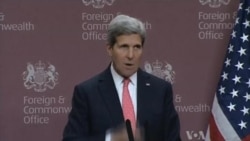STATE DEPARTMENT —
U.S. Secretary of State John Kerry is in Europe for talks on getting to a transitional government to end Syria's civil war. But there are divisions within the opposition and questions over Iran joining those talks.
International efforts to end the fighting in Syria focus on getting President Bashar al-Assad's government and his opponents to agree to peace talks. Syria's opposition is deeply fractured, with some elements refusing to attend talks in Geneva unless President Assad first steps down.
At Tuesday's meeting of the so-called "London 11" backing Syria's opposition, Britain's Foreign Secretary William Hague urged those groups to come together behind peace talks in Geneva.
"We urge the National Coalition to commit itself fully to the Geneva 2 process and to lead and form the heart of any opposition delegation. Geneva offers the Syrian people the best hope to improve their lives," said Hague.
Lebanon: 793,615
Jordan: 547,274
Turkey: 502,737
Iraq: 197,301
Egypt: 126,051
Source: UNHCR
U.S. Secretary of State John Kerry said there is no military solution to the conflict.
"This war will not come to an end on the battlefield, I believe, and I think most people believe, it will come to an end through a negotiated settlement."
Assad has agreed in principle to join those talks and wants Iran to come along as part of the process. That is a move backed by Russia, which along with Iran, is the Syrian government's main supporter.
Former U.S. ambassador Adam Ereli said Iran will never allow this conflict to end in a way that weakens its position.
"Think of Iran's support for Bashar al-Assad not as an offensive move but as a defensive move to keep their enemies farther away, at bay, to give them [Iran] a capability to protect the homeland by having an ally in Damascus," said Ereli.
Iranian President Hassan Rouhani is moving forward on talks over Tehran's nuclear program - momentum that may carry over to talks on Syria, says American University professor Akbar Ahmed.
"You're seeing a certain thaw emerging, and in that sense Iran I think will play an even more active role in what is happening in Syria, and I think that will be opening-up a different kind of dialogue with Western powers."
This "London 11" meeting is also discussing the war's humanitarian impact with more than two million Syrians displaced by the fighting.
International efforts to end the fighting in Syria focus on getting President Bashar al-Assad's government and his opponents to agree to peace talks. Syria's opposition is deeply fractured, with some elements refusing to attend talks in Geneva unless President Assad first steps down.
At Tuesday's meeting of the so-called "London 11" backing Syria's opposition, Britain's Foreign Secretary William Hague urged those groups to come together behind peace talks in Geneva.
"We urge the National Coalition to commit itself fully to the Geneva 2 process and to lead and form the heart of any opposition delegation. Geneva offers the Syrian people the best hope to improve their lives," said Hague.
Syrian Refugees by Country
Syrian Refugees by CountryLebanon: 793,615
Jordan: 547,274
Turkey: 502,737
Iraq: 197,301
Egypt: 126,051
Source: UNHCR
U.S. Secretary of State John Kerry said there is no military solution to the conflict.
"This war will not come to an end on the battlefield, I believe, and I think most people believe, it will come to an end through a negotiated settlement."
Assad has agreed in principle to join those talks and wants Iran to come along as part of the process. That is a move backed by Russia, which along with Iran, is the Syrian government's main supporter.
Former U.S. ambassador Adam Ereli said Iran will never allow this conflict to end in a way that weakens its position.
"Think of Iran's support for Bashar al-Assad not as an offensive move but as a defensive move to keep their enemies farther away, at bay, to give them [Iran] a capability to protect the homeland by having an ally in Damascus," said Ereli.
Iranian President Hassan Rouhani is moving forward on talks over Tehran's nuclear program - momentum that may carry over to talks on Syria, says American University professor Akbar Ahmed.
"You're seeing a certain thaw emerging, and in that sense Iran I think will play an even more active role in what is happening in Syria, and I think that will be opening-up a different kind of dialogue with Western powers."
This "London 11" meeting is also discussing the war's humanitarian impact with more than two million Syrians displaced by the fighting.






